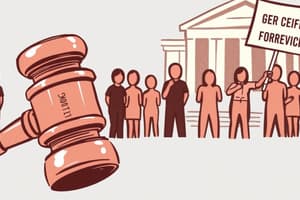Podcast
Questions and Answers
What must engineers not offer to secure work?
What must engineers not offer to secure work?
- Advertising services
- Gifts or other valuable considerations (correct)
- Payment to a bona fide employee
- A commission to an established agency
What should engineers do when they recognize an error?
What should engineers do when they recognize an error?
- Blame it on external factors
- Cover it up to save reputation
- Acknowledge it honestly (correct)
- Ignore it and move on
When considering outside employment, what should engineers do first?
When considering outside employment, what should engineers do first?
- Discuss with close colleagues
- Accept without informing anyone
- Notify their current employers (correct)
- Review their workload only
How should engineers treat their profession?
How should engineers treat their profession?
What is encouraged for engineers in relation to public interest?
What is encouraged for engineers in relation to public interest?
What must engineers not do regarding plans and specifications?
What must engineers not do regarding plans and specifications?
Which of the following actions promotes sustainable development?
Which of the following actions promotes sustainable development?
What kind of conduct should engineers avoid?
What kind of conduct should engineers avoid?
In which areas are engineers encouraged to participate?
In which areas are engineers encouraged to participate?
What action should engineers take if a project is deemed likely to fail?
What action should engineers take if a project is deemed likely to fail?
Flashcards are hidden until you start studying
Study Notes
Legal and Ethical Obligations
- Lies on tax returns and sworn testimony highlight the conflict between legality and morality.
- Historical laws, such as slavery in the 1800s, illustrate how laws can be deemed unethical or immoral over time.
- Civil disobedience is justified when laws conflict with moral or ethical standards.
- Government uses coercive power to enforce laws, with severe penalties for law violations, while ethical breaches typically result in social disapproval rather than legal consequences.
Ethics and Religion
- Ethics can exist independently of religion, but religious institutions play a significant role in moral education.
- Religious texts and teachings provide frameworks for understanding ethical conduct.
- Ethical learning is a lifelong process, with continued development through various life stages, including college and professional experience.
- Many ethical principles, like informed consent in medical research, require specialized education and practical understanding.
Ethical Concerns in Science
- Recent scientific controversies, including secret Cold War experiments and genetic engineering, have raised public ethical concerns.
- Some believe unethical behavior in science stems from psychological issues, rather than systemic flaws, arguing that scientific rigor catches misconduct early.
- Scientists often view their work as objective, leading to a belief that ethical issues are secondary to scientific inquiry.
- Ethical standards in science are seen as straightforward; scientists know not to falsify data without the need for in-depth ethical discussions.
Need for Ethical Instruction in Science
- While informal learning about ethics occurs, formal instruction is necessary due to the complex nature of modern science and research environments.
- Ethical knowledge relies on clear communication and understanding among a large number of personnel in research settings.
Professional Obligations of Engineers
- Engineers are required to report unethical practices and cooperate with authorities while maintaining competence in their areas of work.
- Public statements by engineers must be truthful and based on objective facts, with transparency about interests in matters discussed.
- Gift-giving to secure work is prohibited, as is paying commissions, except in specific, legitimate contexts.
Standards of Integrity
- Engineers must uphold honesty and integrity, acknowledging errors without distorting facts and advising against unfeasible projects.
- All engineers must strive to serve the public interest, including participation in civic duties and adherence to engineering standards.
- The promotion of engineering should take place while ensuring that practices do not mislead the public.
Commitment to Sustainable Development
- Engineers are encouraged to adhere to sustainable development principles to safeguard the environment for future generations while serving the community's well-being.
Studying That Suits You
Use AI to generate personalized quizzes and flashcards to suit your learning preferences.




